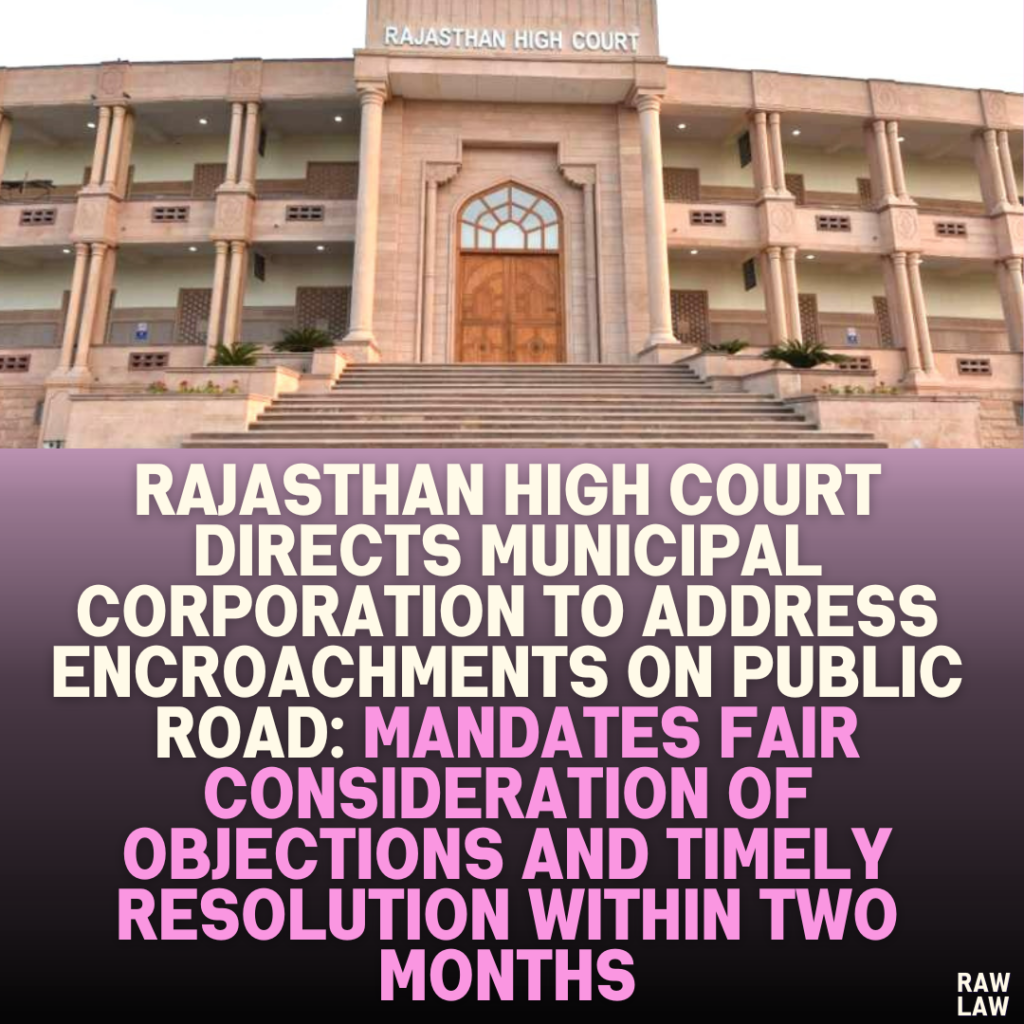Court’s Decision:
The Rajasthan High Court disposed of a public interest litigation (PIL) seeking action against alleged encroachments on a public road. The court emphasized the need for the Municipal Corporation to address objections from the alleged encroachers fairly and conclude the proceedings expeditiously within two months. It also directed that those dissatisfied with the Corporation’s decisions could pursue appropriate legal remedies.
Facts:
- Filing of PIL (2019): The case originated from a PIL filed in 2019, where the petitioner alleged illegal encroachments on a public road in Jaipur.
- Municipal Corporation’s Action (2024): During the pendency of the case, the Municipal Corporation issued eviction notices in December 2024 to 97 individuals identified as encroachers.
- Responses to Notices:
- A group of 35 individuals submitted objections to the eviction notices.
- Some voluntarily removed their constructions.
- Others neither submitted objections nor removed their structures.
- Applications for Impleadment: Certain individuals, claiming valid possession or authority over the land, sought to join the proceedings as parties.
Issues:
- Did the authorities fail to act promptly in addressing the encroachments since the PIL was filed in 2019?
- Were the rights of individuals claiming valid possession adequately considered in the proceedings?
Petitioner’s Arguments:
- Delay in Action: Despite filing the PIL in 2019, the authorities did not take meaningful action until December 2024.
- Urgent Resolution: The petitioner argued for the court to intervene and direct the authorities to expedite the proceedings and ensure removal of encroachments.
Respondent’s Arguments:
- Steps Taken: The Municipal Corporation highlighted that eviction notices had been issued to 97 individuals, with 35 submitting objections.
- Voluntary Compliance: Some individuals had voluntarily removed their structures.
- Pending Objections: The Corporation assured the court that the objections raised, including those by the impleadment applicants, would be addressed as per law.
Analysis of the Law:
- Duty of Municipal Authorities: Under municipal and urban development laws, authorities are obligated to ensure that public roads remain free from encroachments. They must also address disputes over possession claims fairly and promptly.
- Procedural Fairness: The court reiterated the principle that eviction actions must comply with due process, allowing individuals to present objections and ensuring decisions are made in writing.
- Accountability in Governance: The authorities are responsible for timely enforcement of public interest while balancing the rights of affected individuals.
Precedent Analysis:
Although the court did not cite specific precedents, its directives reflect broader principles established in similar cases:
- Public roads must remain unencumbered by encroachments.
- Encroachers must be given adequate opportunity to defend their position, following due legal procedures.
Court’s Reasoning:
- Timely Action Required: The court observed that the proceedings had been delayed since the PIL’s filing in 2019, noting that eviction notices were issued only in late 2024. It emphasized that such delays undermine public interest.
- Objections to be Addressed: The court instructed the Corporation to carefully consider and decide on the objections submitted by individuals, including those by impleadment applicants.
- Enforcement Against Non-Responders: In cases where no objections were raised, the court allowed the Corporation to proceed with enforcement action as per law.
- Recourse for Aggrieved Parties: It directed that individuals dissatisfied with the Corporation’s decisions could seek legal remedies through available forums.
Conclusion:
- Two-Month Deadline: The court set a strict timeline, directing the Municipal Corporation to dispose of all objections and pass written orders within two months.
- Proceed as per Law: The Corporation was given liberty to enforce eviction against unresponsive encroachers in accordance with the law.
- Access to Legal Remedies: Aggrieved individuals were granted the liberty to challenge the Corporation’s decisions through appropriate legal avenues.
Implications:
- Accountability: The judgment underscores the importance of timely administrative action to resolve public grievances.
- Balanced Approach: While prioritizing the removal of encroachments to protect public roads, the court highlighted the need for fairness and due process in dealing with the affected individuals.
- Precedent for Timely Action: This case sets a precedent for municipal authorities to act promptly in similar situations and avoid unnecessary delays in addressing encroachments.
- Empowerment of Affected Individuals: By allowing aggrieved individuals to challenge decisions, the court ensures checks and balances in administrative actions.




Pingback: Bombay High Court Directs Compensation for Railway Accident: "Absence of Ticket Does Not Negate Bonafide Passenger Status," Declares Fall from Overcrowded Train an "Untoward Incident" - Raw Law